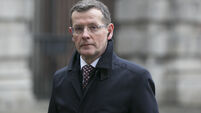Troika ‘did not consider bailout effects on public’

“You need to bring the people with you and that is very difficult. This is year seven of austerity and people are getting weary. You only have one life to live and, if a decade of that is taken out by bad economic management, people lose heart,” said Mr Noonan at a conference in Dublin Castle organised by the International Monetary Fund (IMF).
He said one of the main lessons to be learned from Ireland’s bailout is that the programme needs to be flexible. The Government asked the troika to change elements that were not working, said Mr Noonan.













